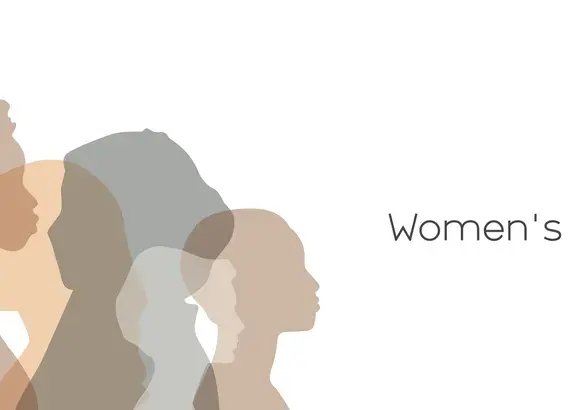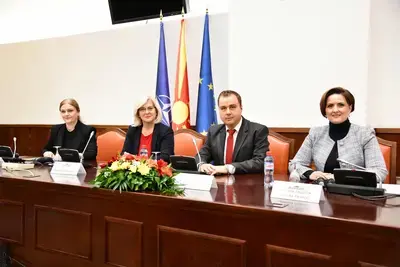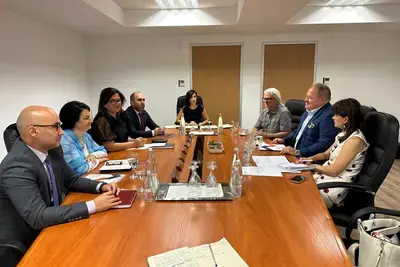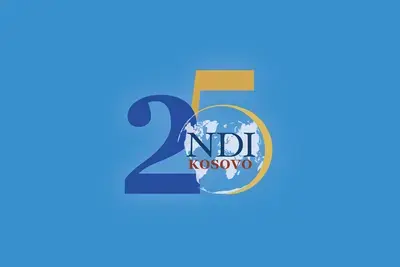
Success Story
Kosovo’s Democracy Demands Gender Equality
On this International Women’s Day, let us all stand in solidarity with Ukraine and recommit ourselves to building strong inclusive democracies and the values of peace and justice they embody.
While still far from parity, women can celebrate the many global gains in equality. Over the last 20 years, the percentage of women in parliaments around the world has nearly doubled, and women are increasingly taking on positions of power as civil society activists, political party leaders, and leaders at all levels of government. Awareness of violence against women in politics is rising, and more businesses and governments are enacting strict policies against discrimination against women.
Yet, at the current rate, none of us alive today will ever see full gender parity - a goal that is more than 100 years away. Today, just 25 percent of members of parliament are women, only 21 percent are government ministers, and only ten percent of national leaders are women. Men in leadership are failing to support the women they supposedly represent. Around the world, women are the majority of the poor, uneducated, unhealthy and unfed.
Why do we keep handicapping half the world’s talent? Research clearly shows that when women are free to vote and run for public office, governments are more effective and responsive to their people. When women are free to earn a living and start small businesses, they drive more economic growth. When women can go to school and get healthcare, their families and communities prosper. When women have equal rights, nations are more stable, peaceful and secure.
Leaving women out of the formal economy leaves nations with a half-powered economy. Leaving women out of education leaves an ignorant population. The opposite is also true. Bring women into education, and their children – and the country’s economy – become more prosperous. Bring women into negotiating discussions, and they help end civil wars and build a sustainable peace.
I was proud to represent the United States - one of just two women out of fifteen ambassadors around the table - when the UN Security Council passed in 2000 the groundbreaking UN Resolution 1325 calling for equal participation of women in peace processes. Yet, in the two decades since, women remain on the sidelines of most such efforts today. But where women are fully empowered to help build a just and lasting peace, such as in Northern Ireland, South and West Africa, East Timor, and Latin America, the peace is stronger. If they are marginalized, so are the prospects for a lasting peace.
Today in Kosovo, I see first hand the importance of the empowerment of women, where the National Democratic Institute (NDI), supported by USAID, is working to promote gender equality at all levels of society. Forging a vibrant democracy in Kosovo requires ensuring women, youth and underrepresented communities are at the table in all sectors of Kosovo’s society. Thus, we are working to expand women, peace, and security programs beyond security institutions and narrow definitions of peace to a broader framework utilizing the linkages between education, health, justice and all people’s security from all types of violence: structural, gender-based, racist. We are doing this in three important ways: preparing more women for elected office, breaking the barriers to power for all women regardless of their age, class, and ethnicity; and engaging male allies.
Today, Kosovo is making important progress. More women are playing meaningful roles in public life--within political parties as candidates and leaders, through civil society organizations, and leading in government. In last fall’s local elections, more women ran for office, more headed their party’s candidate lists, and more were elected without the quota. At the national level, Kosovo has its second woman president, and a record two women deputy prime ministers, one of whom also serves as one of the five women ministers, eight chairs of the 14 committees, and a record 43 members of parliament, 34 of whom were elected without the quota.
Women and youth propelled this groundbreaking change. And polls show women are seen as more honest, compassionate and intelligent. Thus the ground is set for even further, faster progress toward gender equality.
Kosovo has worked hard to establish guidelines and priorities aimed at eliminating barriers to women’s full political and economic participation, including through the 2012 Pristina Principles endorsed by more than 200 international leaders at a summit organized by NDI and then-President Atifete Jahjaga. During the Biden Administration’s Global Democracy Summit, Kosovo’s current president, Vjosa Osmani, committed to strengthening women’s role, including harmonizing the country’s laws regarding gender equality, keeping Kosovo at the forefront of women’s empowerment.
Despite the impressive progress, there is much work left to do. Women in government at the local levels are marginalized, few have top leadership positions in main political parties, and most companies are owned by men. They remain at a distinct systemic economic and political disadvantage. Women in politics face misogyny and online and physical violence. Socially, Kosovo’s patriarchal norms present a significant barrier. And during this pandemic, women have disproportionately borne the brunt of the increased household workloads and decreased job opportunities.
And so we must frankly confront the barriers that keep women from participating fully in public life, from being heard, and from leading: as organizers and activists in their own communities, as municipal leaders, and up to the highest levels of government. And the progress being made in Kosovo feeds directly into global efforts. Through our “Changing the Face of Politics” campaign, NDI joined the UN’s decade-long campaign to “accelerate the pace of change” to end gender discrimination by 2030.
As an important part of this effort, men must also do more, and become champions for gender equality. That means mentoring women, bringing them to the decision-making table, integrating them into their networks, and providing them access to finances. Simply put, women’s equality will not be achieved without a full partnership with men.
Kosovo’s democracy – and the world’s democracies - will be secure when women’s voices are equitably represented throughout the country’s political system. NDI is a proud partner in that effort.



